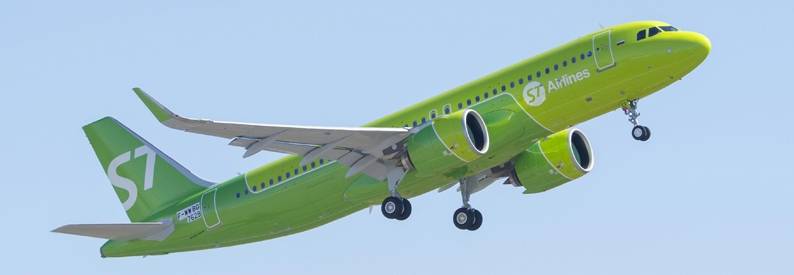Dmitry Yadrov, head of Russia’s civil aviation regulator (Rosaviatsiya), has confirmed that S7 Airlines (S7, Novosibirsk) is experiencing problems keeping its fleet of A320neo and A321neo aircraft in the air, with Western sanctions on Russia hampering the maintenance of their Pratt & Whitney PW1000G engines. Separately, S7 has come out in opposition to a Kremlin plan to reconstruct airports at the expense of airlines’ revenues.
Yadrov told the Russian news agency TASS on July 1 that the P&W issue could affect overall passenger numbers in the country, which are forecast to fall by 7% this year to 98.1 million. According to him, Russia’s overall passenger forecast depends on how many of the neo narrowbodies S7 will take out.
“These aircraft carry a significant volume of passengers, but the operation of these engines requires increased attention – operators around the world have complained about this. For now, we are moving towards the figure of 98.1 million. In August-September, there will be a more precise understanding of what final passenger flow figure Russian civil aviation will reach by the end of 2024,” he said.
Last October, it was reported that S7 Airlines’ ensuing winter schedule would have to be trimmed by 10-15% compared to the previous year to account for the grounded Airbus aircraft. A source at Russia’s Ministry of Transport told the newspaper Kommersant that neither S7 Technics nor Iran, which works on “more mass-produced and understandable equipment,” have been able to carry out P&W repairs.
The ch-aviation fleets module shows that S7 Airlines operates thirty-one A320-200Ns (of which fifteen are currently grounded, up from five nine months ago), four A321-200Ns (all grounded), and four A321-200NX (all grounded). All are powered by Pratt & Whitney engines.
Airport reconstruction fund
In related news, S7 Airlines has voiced its opposition to a plan to rebuild airport runways and terminals at the expense of airline revenues, while Aeroflot (SU, Moscow Sheremetyevo) has warned that the burden will inevitably fall on passengers through the imposition of higher ticket prices.
A Rosaviatsiya representative told the Russian broadcaster RBK that the Air Transport Infrastructure Fund, as it will be known, was being created according to an instruction from President Vladimir Putin dated February 18, 2024. Money for it will start to be collected in August, Yadrov said during a session of the transport development council at Russia’s Federation Council on July 1. Specifically, the fund will be filled by hiking air navigation fees for airlines. In total, the fund will pay for reconstruction at 51 airports, the first on the list being Cheboksary. He added that “we plan to collect around RUB10-12 billion rubles” (USD114-137 million) annually for the purpose.
“S7 Airlines does not support the proposed initiative. Over the last few years, the burden on airlines in terms of airport costs has already risen significantly – especially where projects to build new terminals have been implemented. At those airports where projects have already been implemented, the cost of servicing a flight has doubled in some cases. Since November 2022, air navigation fees have increased by 76%. Further growth may lead to a general increase in the cost of air tickets on the market,” an S7 spokesperson told RBK on July 2.
An Aeroflot representative said that “it is important to understand that regardless of the source of money for the formation of the fund, ultimately this burden falls on the passenger.”
In further related news, Moscow Arbitration Court will consider a claim of S7 Airlines against a Moscow-based investment firm, Tsifra Broker, for RUB1 billion (USD11.16 million) on July 10. According to court papers, the case is related to losses from the defendant’s improper – in the plaintiff’s opinion – performance of obligations to acquire shares and depositary receipts in the technology company Yandex NV.

